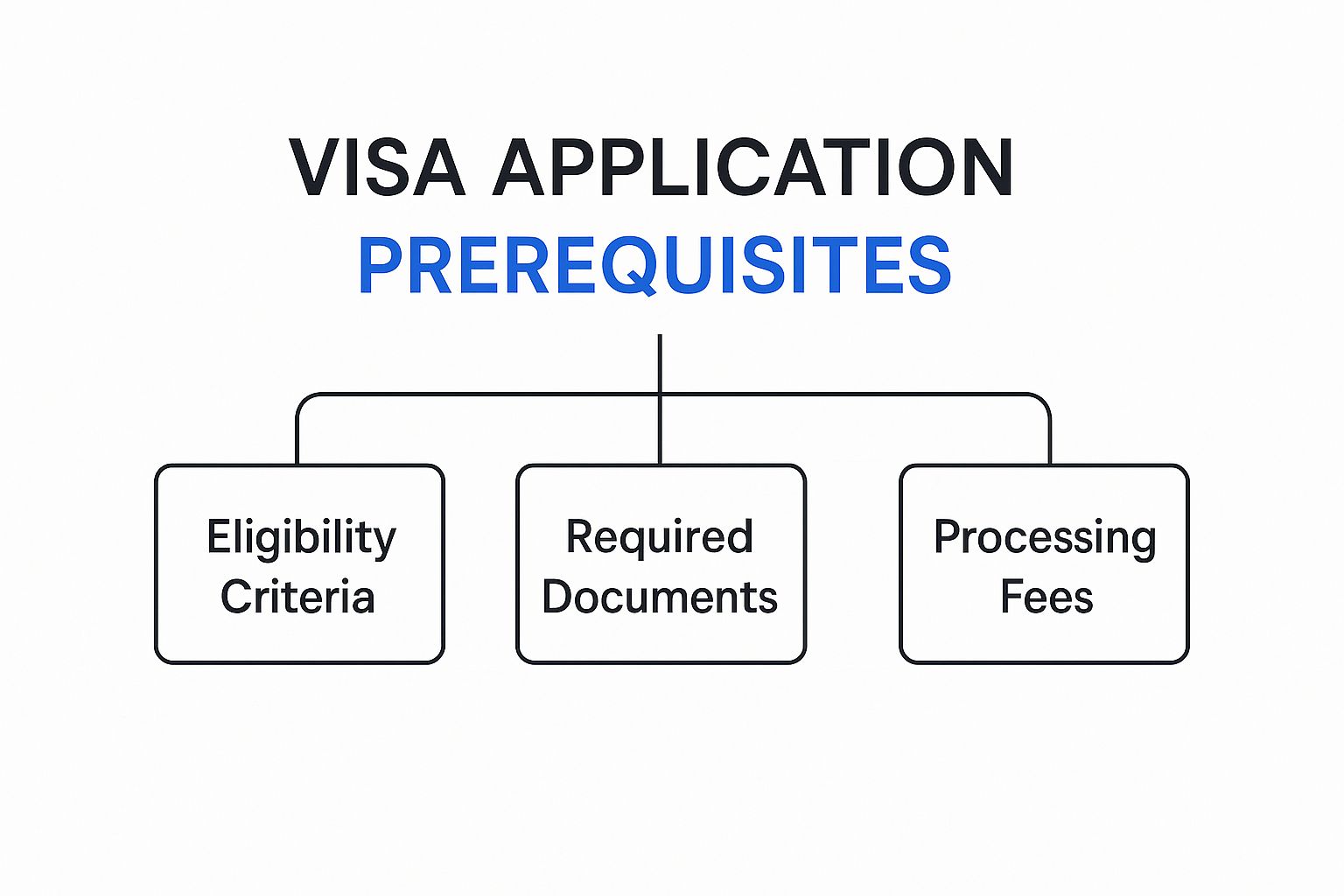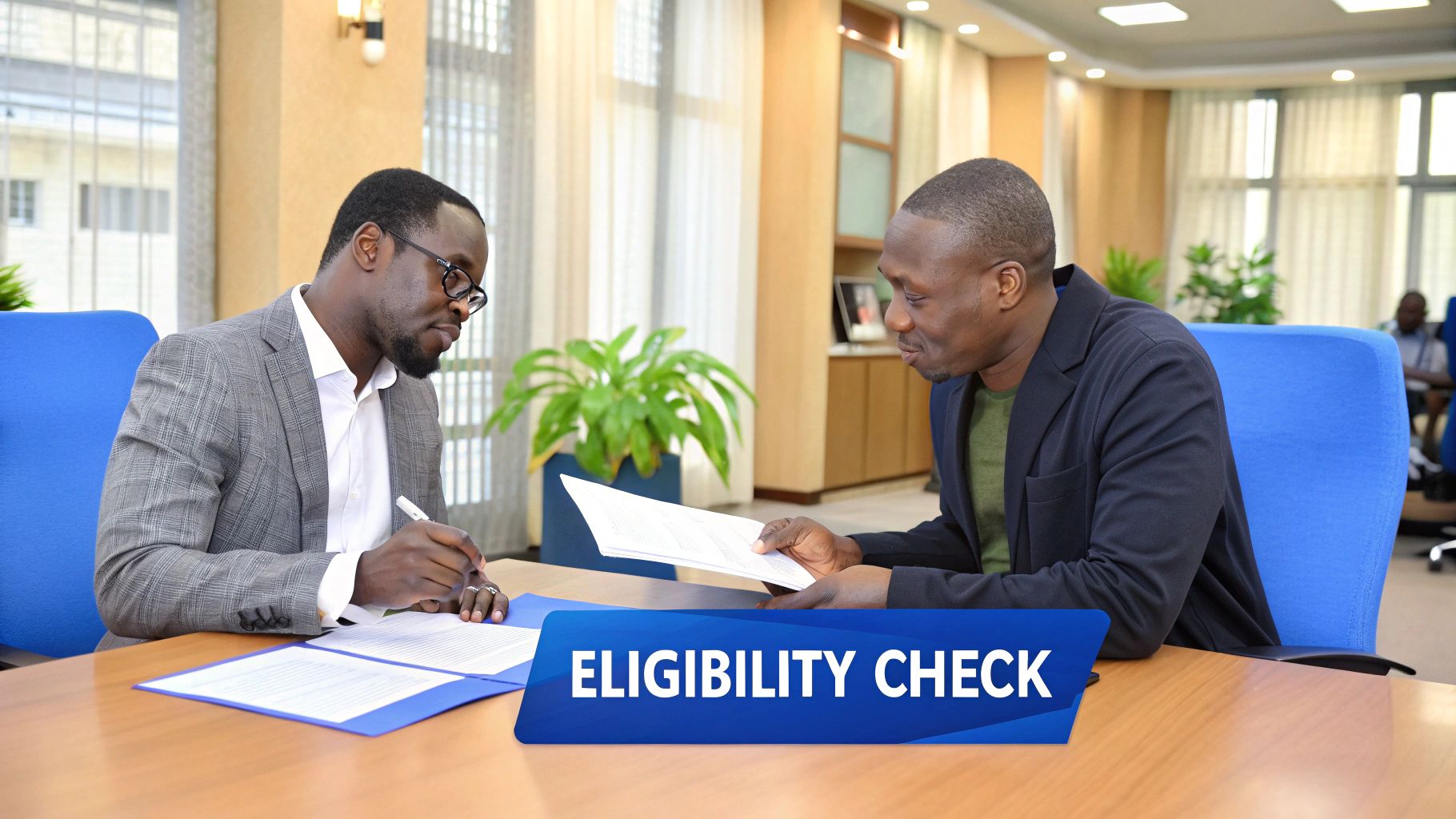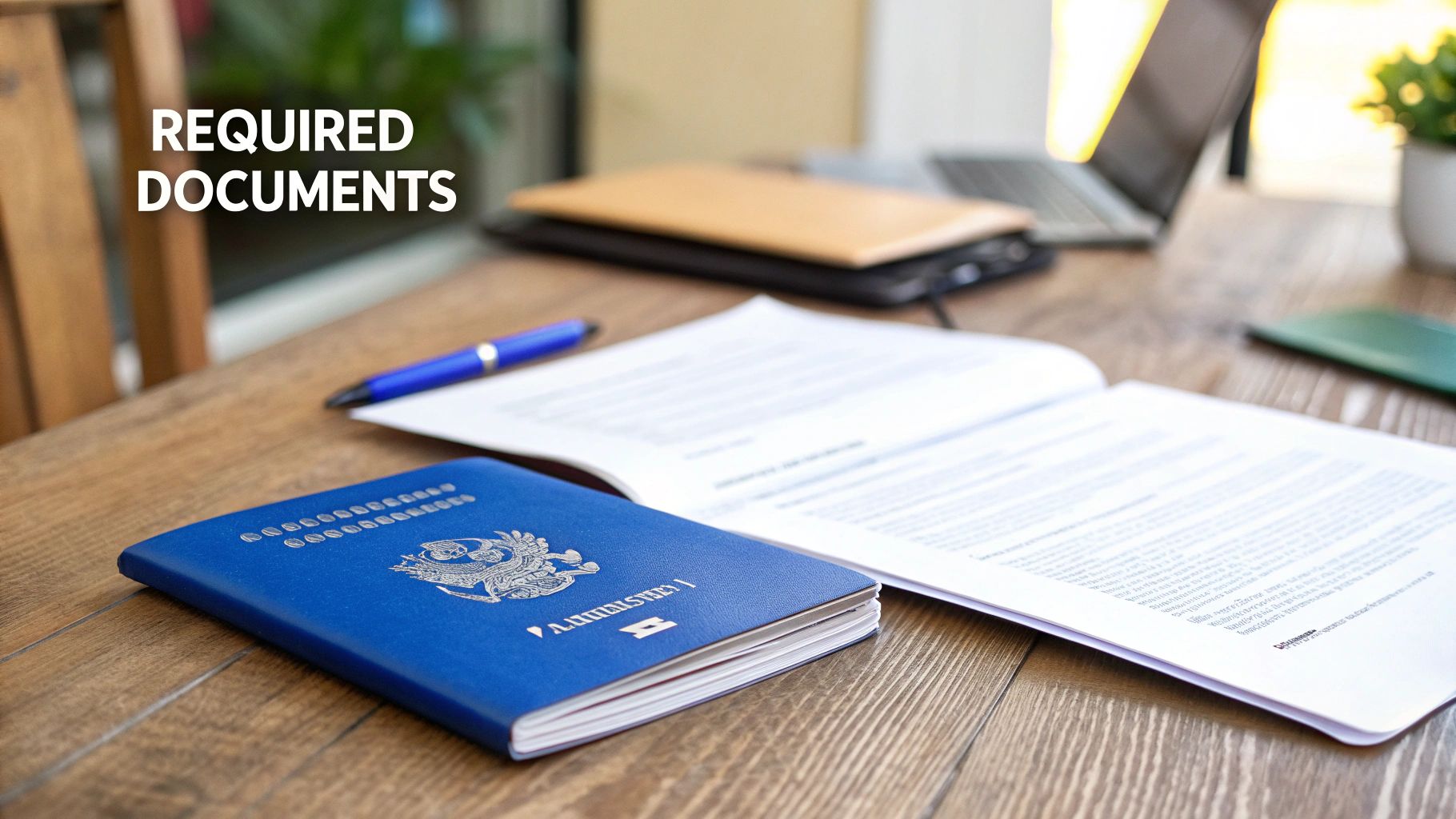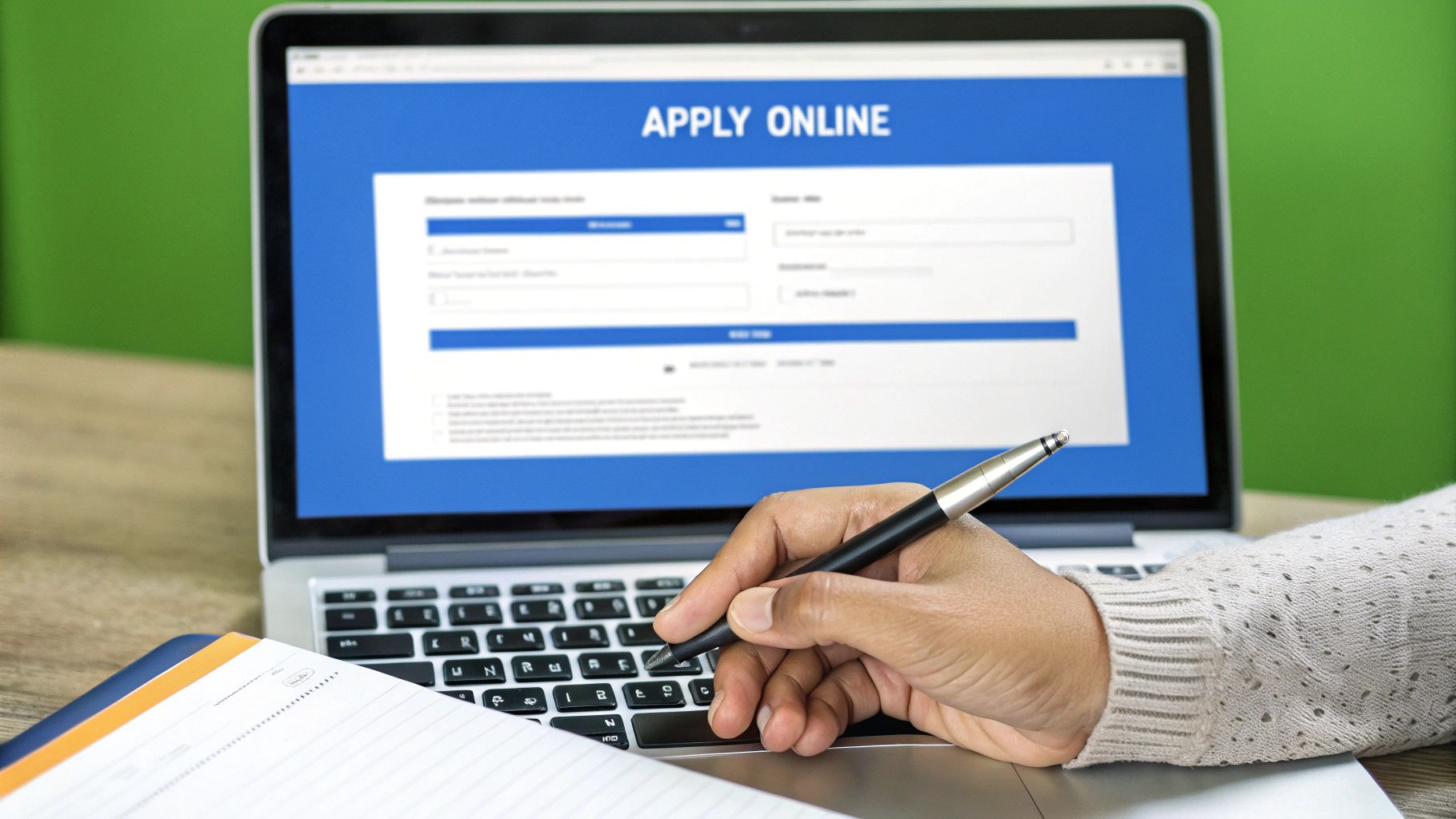Ireland Visa Requirements in Nigeria: Your Essential Guide

Cracking The Code: Ireland's Visa System For Nigerians
Think of Ireland's visa system as a giant library. Navigating it might seem daunting at first, but once you understand the system – how the books (visas) are categorized and shelved – finding the right one for your needs becomes much easier. This guide acts as your librarian, walking you through the Irish visa landscape specifically for Nigerian applicants. We'll explore the different "genres" of visas available and how they align with your travel "story."

The infographic above provides a visual snapshot of the core components of a visa application: Eligibility Criteria, Required Documents, and Processing Fees. These are the building blocks you'll need to assemble a successful application.
Understanding Visa Categories and Their History
Just as a library has different sections for fiction, non-fiction, and biographies, Ireland offers a variety of visa types, each tailored to a specific purpose. Need a relaxing getaway? A tourist visa is your ticket. Pursuing higher education? A student visa is essential. Looking to strike business deals? A business visa is what you’ll need.
These categories haven't always been so clearly defined. The migration story between Nigeria and Ireland has evolved over time. In the past, many Nigerians traveled to Ireland via the UK, using their British visas as a stepping stone before returning to the UK. This was a common route before dedicated immigration pathways between Nigeria and Ireland became more established. Today, the landscape is different. As of 2022, over 20,559 Nigerian-born individuals call Ireland home. To delve deeper into this evolving migration story, check out this resource: Searching for Greener Pastures.
Why Choosing the Right Visa Is Crucial
Imagine trying to borrow a cookbook using a library card meant for the audio-visual section. It just won’t work. Similarly, applying for the wrong Irish visa can lead to frustrating delays, outright rejections, and wasted money. It's like taking the wrong medicine – not only will it not solve the problem, but it could also create new ones. Later in this guide, we’ll share real-life examples of successful applicants and how they chose the visa that perfectly matched their individual circumstances.

This screenshot from the official Irish Embassy website in Nigeria provides a quick glance at the various visa services available, giving you a starting point for exploring your options.
Navigating the Nuances of Visas
Just as some books might appear similar at first glance but tell completely different stories, many visa categories have subtle differences that can trip up applicants. For example, a short-term business visa and a long-term work permit may seem alike, but they cater to different purposes and have distinct sets of requirements. We'll unravel these nuances to help you avoid common mistakes. By understanding these subtle differences, you'll be empowered to make informed choices throughout the application process, increasing your chances of a successful outcome and making the journey smoother overall.
| Visa Type | Purpose | Maximum Stay | Multiple Entry | Processing Time |
|---|---|---|---|---|
| Tourist Visa | Leisure travel, visiting family/friends | 90 days | No | Varies, typically 8 weeks |
| Business Visa | Short-term business activities, meetings, conferences | Varies, typically 90 days | Potentially, depending on the specific visa | Varies, typically 8 weeks |
| Study Visa | Pursuing education in Ireland | Duration of the course | Potentially, depending on the specific visa | Varies, typically 8 weeks |
| Work Permit | Long-term employment in Ireland | Duration of the employment contract | Yes | Varies, typically several months |
| Join Family Visa | Joining family members already residing in Ireland | Varies, depending on the family member's status | Yes | Varies, typically several months |
This table provides a general overview and processing times can fluctuate. For the most up-to-date information, always refer to the Irish Naturalisation and Immigration Service (INIS) website. Remember, each visa type has its own specific set of requirements, and it's crucial to research the specifics relevant to your situation.
Documents That Actually Win Approvals
Your visa application documents aren't just forms; they're your chance to tell a story to Irish immigration officials. Imagine applying for a loan. The bank needs more than just your promise to repay. They need proof you're a good investment. Your visa documents work the same way. They must show you're a legitimate visitor who will respect the visa terms and return to Nigeria after your trip.
The Power of a Connected Story
One common mistake Nigerian applicants make is submitting generic documents without a clear, overarching narrative. It’s like reading a book with disconnected chapters. Confusing, right? Your application needs to tell a cohesive story, with each document supporting the others. For a student visa, for instance, your acceptance letter, bank statements, and statement of purpose should all align with your academic goals. Want help writing a strong statement? Check out our guide on writing a compelling letter of intent for your visa application.
Bank Statements: Showing Stability
A powerful bank statement isn't just about having lots of money. It’s about showing a history of responsible financial management. It's like building a reputation. One big deposit is less convincing than regular income and sensible spending habits. Visa officers look for stability. They need to see you can support yourself in Ireland without needing public assistance.
Invitation Letters: Personal Touches Matter
When visiting family or friends, the invitation letter should feel warm and personal, not like a generic online template. A birthday card with a generic message feels impersonal, right? An invitation letter should genuinely reflect the relationship between the host and the applicant, including shared experiences, specific plans, and the real reasons for your visit.
Avoid These Document Pitfalls
Even small errors can raise doubts about your application. Here are some common issues to avoid:
- Mismatched Information: Any differences between your application form and supporting documents can damage your credibility.
- Missing Pieces: Imagine submitting a puzzle with missing pieces. Make sure you have every required document for your visa type.
- Unreadable Copies: Blurry or illegible documents hinder verification, leading to delays or rejection.
- Expired Documents: Using an outdated passport or old bank statements suggests a lack of organization.
Making Your Application Stand Out
Here's how to present a polished and professional application:
- Organize and Label: Use dividers and clear labels to help visa officers easily navigate your documents.
- Certified Translations: Documents not in English or Irish must be accompanied by certified translations.
- Double-Check Everything: Review every single document for mistakes, missing information, or inconsistencies.
- Professional Presentation: A neat and organized application shows attention to detail and respect for the process.
Before submitting your application, take a look at the table below for a quick and easy checklist of required documents based on the visa category you are applying for.
To make things easier for you, we've compiled a handy checklist:
| Document | Tourist | Business | Student | Family Visit | Notes |
|---|---|---|---|---|---|
| Valid Passport | ✓ | ✓ | ✓ | ✓ | Ensure it's valid for at least 6 months beyond your intended stay. |
| Application Form | ✓ | ✓ | ✓ | ✓ | Complete accurately and truthfully. |
| Photographs | ✓ | ✓ | ✓ | ✓ | Recent passport-sized photos meeting Irish visa specifications. |
| Flight Itinerary | ✓ | ✓ | ✓ | ✓ | Confirmed round-trip tickets. |
| Accommodation Proof | ✓ | ✓ | ✓ | ✓ | Hotel reservations, or letter of invitation from host. |
| Financial Statements | ✓ | ✓ | ✓ | ✓ | Bank statements demonstrating sufficient funds for your trip. |
| Travel Medical Insurance | ✓ | ✓ | ✓ | ✓ | Coverage for the duration of your stay. |
| Letter of Invitation | ✓ | From your family or friends in Ireland. | |||
| Business Documents | ✓ | Company registration, invitation letter from an Irish business. | |||
| Acceptance Letter | ✓ | From a recognized Irish educational institution. | |||
| Proof of Finances for Studies | ✓ | Tuition payment confirmation, scholarship details, or proof of sponsorship. |
This checklist ensures you have all the necessary documents depending on your visa category. Remember to tailor the specific documents to your circumstances.
By presenting a cohesive narrative and following these tips, your documents will become your strongest advocates. Let them speak clearly and persuasively on your behalf, making your Irish visa application a success.
Navigating The Application Journey Like A Pro

Getting an Irish visa from Nigeria isn't just about filling out forms; it's a process that needs a good strategy. Think of it like planning a road trip. You wouldn't just hop in the car and go, right? You'd map your route, plan your stops, and pack what you need. Getting an Irish visa is similar – it takes planning, preparation, and understanding the steps involved.
Mastering The Application Process
The application itself can seem complicated, but with the right approach, you can navigate it confidently. First, timing is crucial. Applying during busy periods can cause delays. It's like trying to get a table at a packed restaurant – you'll probably be waiting.
Next, presentation matters. A well-organized application shows visa officers you're serious and pay attention to detail. Imagine getting a gift wrapped haphazardly versus one that's beautifully presented. The well-presented one makes a better impression, right? The same goes for your visa application.
Finally, communication is key. Be clear and direct in your answers, making sure they match the information in your supporting documents. Think of it like telling a story – a consistent narrative builds trust.
Tackling Tricky Questions And Complex Situations
Many applications have tricky questions. Don't let them scare you. See them as a chance to show your real intentions. For example, if you've had gaps in your employment, explain them honestly and include supporting documents. It's like filling in the missing parts of a story.
Explaining complex personal details, like past travels or specific family situations, needs careful thought. Be open but don't share too much. Think of it like highlighting the important parts of your resume while leaving out unnecessary details. Present a clear picture of your situation.
Acing The Embassy Appointment
The embassy appointment is often the last step. Prepare for it like a job interview. Dress professionally, make eye contact, and answer questions confidently and honestly. Authenticity matters. You want to appear genuine and confident, not like you're reading from a script. If you're not sure how to track your application afterward, check out our guide on visa application tracking.
For Nigerians traveling to Ireland, getting a visa is essential. The Irish Embassy in Abuja handles applications, and decisions are posted online regularly. However, specific numbers on visas issued to Nigerians yearly aren't easily found. Changes in migration trends, with fewer asylum applications and more residency through family, suggest more Nigerians seek legal residency over asylum. The lack of detailed past records makes it hard to give exact numbers on visa approvals and denials over time. Discover more insights about weekly decision reports.
By approaching your Irish visa application strategically, you can greatly improve your chances. Remember, preparation, presentation, and communication are important. Take the process seriously, and you'll be well on your way to achieving your travel goals.
Financial Proof That Builds Trust, Not Suspicion

Applying for an Irish visa from Nigeria? Your financial documentation is key. It's more than just showing a big bank balance; it's about presenting a clear, believable snapshot of your finances. Think of it like building a house: a solid foundation of consistent financial history is better than a flashy but unstable structure.
Decoding What Visa Officers Look For
Visa officers are trained to spot inconsistencies. They want to see that your finances align with your reason for travel. A steady income, even a modest one, often matters more than a sudden, unexplained cash deposit. This demonstrates stability and reduces the perceived risk of you overstaying.
For a tourist visa, for example, your bank statements should show you can cover your trip without impacting your financial well-being back home. For a student visa, the focus is on showing how you'll pay for tuition and living expenses.
Handling Challenging Financial Situations
Financial lives can be complex. Maybe you have irregular income, rely on family support, or have other unique circumstances. The key is transparency. Explain any unusual transactions, and back them up with documents if you can.
If your trip is family-funded, a letter from your sponsor confirming their support adds credibility to your application.
Red Flags and Positive Indicators
Some financial patterns can raise concerns. Large, unexplained deposits right before applying, inconsistent transactions, or a mismatch between your stated travel purpose and your financial capacity can trigger closer scrutiny.
On the other hand, a stable job history, regular savings, and a clear link between your finances and your trip plans build confidence in your application.
This ties into the history of Nigerian migration to Ireland. Ireland's economic boom (the "Celtic Tiger" period) drew many Nigerians seeking work. Between 2002 and 2006, the Nigerian population in Ireland grew by a remarkable 81.7%. This illustrates the link between economic opportunity and migration. Discover more insights about Nigerians in Ireland.
Demonstrating Ties to Nigeria
Showing strong ties to Nigeria is crucial. Your financial documents can help. Owning property, having business interests, or ongoing financial commitments in Nigeria demonstrate compelling reasons for you to return after your trip.
Calculating Trip Costs and Presenting Additional Assets
Prepare a realistic travel budget. Include expected costs for flights, accommodation, food, and transportation. This demonstrates you’ve planned your trip thoughtfully and have the means to support yourself.
If you own property or have significant business interests, showcase these assets with supporting documents like property deeds or business registration certificates. This reinforces your financial stability and strengthens your ties to Nigeria.
Remember, financial transparency is key. Build trust with the visa officer by presenting a clear and honest picture of your financial situation.
Timing, Costs, And Managing Your Expectations

Getting an Irish visa from Nigeria involves more than just filling out the application. It's about understanding the process, budgeting realistically, and managing expectations. It’s a bit like planning a road trip – you need a map, an idea of how much fuel you’ll need, and a realistic ETA.
Realistic Processing Times and Seasonal Variations
Processing times for Irish visas in Nigeria aren't set in stone. The official timeframe is a guide, but things like seasonal demand, public holidays, or unexpected events can impact the actual waiting period. Think of it like ordering food delivery in Lagos – sometimes it's quick, other times, not so much. Peak times for visa applications, like the summer holidays, often lead to longer processing times. Smart planning around these busy periods can help you avoid delays.
The True Cost of Your Irish Visa
The total cost of your visa application involves more than the visa fee itself. Think of it like furnishing a new apartment – the cost of the furniture is just the start. There are other expenses like document authentication, courier fees to get your passport back, and potentially even reapplication fees if your first attempt isn't successful. Factoring these in from the outset will give you a clearer picture.
What Happens After You Submit Your Application
Once you've submitted your application, the embassy begins its review. This includes verifying your documents, conducting background checks, and evaluating your eligibility against the Ireland visa requirements for Nigerians. You might hear back from the embassy with requests for more information or clarification on certain details. Knowing what kind of communication to expect, and how to respond, is essential for a smooth application process.
Managing Life While Waiting
Waiting for a visa decision can be nerve-wracking. Juggling work, travel plans, and family commitments during this time requires careful planning and communication. It's a bit like waiting for the results of an important exam – the anticipation can be intense. Staying busy with productive activities and keeping up-to-date with your application status can help manage the stress.
The Appeals Process: A Realistic Look
If your application is refused, you can appeal. However, it's crucial to assess whether an appeal is the right course of action, or whether submitting a new, stronger application is a better strategy. It's similar to dealing with a faulty appliance – sometimes it’s a simple fix, sometimes it's better to replace it. Seeking professional advice can help you make the right choice.
To give you a clearer picture of the costs and timelines involved, take a look at this table:
Ireland Visa Fees and Processing Times
Current fee structure and expected processing times for different visa categories
| Visa Type | Fee (EUR) | Standard Processing | Peak Season Processing | Express Available |
|---|---|---|---|---|
| Tourist Visa | 60 | 8 Weeks | 12 Weeks | No |
| Business Visa | 60 | 8 Weeks | 12 Weeks | No |
| Student Visa | 60 | 8 Weeks | 12 Weeks | No |
| Work Permit | 1000 | 12+ Weeks | 16+ Weeks | Case by Case |
These figures are estimates and subject to change. For the most up-to-date details, always refer to the official Irish Embassy website.
By understanding the timeline, the full range of costs, and the overall process, you can navigate the Irish visa application with more confidence and less stress.
Learning From Others' Expensive Mistakes
The journey to getting an Irish visa from Nigeria can be tricky. Many applicants are rejected, often because of mistakes they could have easily avoided. Learning from these slip-ups can be the most valuable part of your application process. It's like learning to ride a bike – reading the manual helps, but seeing someone wobble and almost fall can teach you even more.
Common Reasons For Rejection
Irish visa applications from Nigeria are rejected for all sorts of reasons, from obvious oversights to subtle inconsistencies. Here are some of the common traps:
-
Incomplete Documentation: Imagine trying to build a house without all the bricks. Submitting an incomplete application is similar – it just won't work. Make sure you have every single document needed, specifically for the type of visa you're applying for.
-
Inconsistent Information: Any differences between your application form and your supporting documents can raise suspicion. Your story needs to be the same throughout your application, like a perfectly performed piece of music.
-
Weak Financial Evidence: Not having enough financial documentation, or documentation that isn't convincing, is another common reason for rejection. You need to show you can manage your finances, not just that you have a lump sum in your account. Think of it like proving you can run a marathon, not just that you can sprint for 100 meters.
-
Unclear Travel Purpose: If you don't clearly explain why you're visiting Ireland, the visa officers are left guessing. Be clear about your plans, and make sure your documents support what you say.
Recognizing Warning Signs
Here are some red flags that could mean your application is in trouble:
-
Minor Inconsistencies: Even small things, like different addresses on different forms, can cause problems and lead to more investigation.
-
Lack of Supporting Evidence: Making statements without providing evidence to back them up weakens your application. Always support your claims with documentation.
-
Generic Documentation: Using template letters or generic statements can make your application seem impersonal. Make your application unique and reflect your own situation.
You might be interested in: Common Visa Rejection Reasons
From Rejection To Success: Turning Things Around
Being rejected is disappointing, but it doesn't have to be the end of your journey. Many successful applicants were initially rejected but eventually got their visas by changing their approach. Think of a basketball team reviewing their performance after a loss – they identify their weaknesses, adjust their strategy, and come back stronger. You can do the same with your visa reapplication.
Understanding Different Types of Rejections
Some rejections are easier to fix than others. For example, if you're missing a document, you can simply include it in your reapplication. But bigger problems, like not having strong ties to Nigeria, require a more thorough review of your entire application strategy.
Learning From Case Studies
Looking at real rejection cases can be incredibly helpful. Take Chiebuka's story, for instance. He learned a tough lesson about the financial realities of studying in Ireland. His experience, along with others, shows how important proper financial planning and realistic expectations are, and why you shouldn't rely only on part-time work.
By understanding the reasons behind rejections, recognizing potential problems, and learning from others' experiences, you can greatly increase your chances of getting your Irish visa. Turn those expensive mistakes into valuable learning opportunities and make your next application a winner.
Your Strategic Roadmap To Visa Success
Getting your Ireland visa in Nigeria isn't a game of chance; it's a game of strategy. Think of it like planting a garden. You don't just scatter seeds and hope for the best. You carefully prepare the soil, choose the right plants, and nurture them along the way. This section gathers everything we've covered into a practical action plan.
Creating Your Personalized Visa Strategy
Just like every garden is different, every visa application is unique. Your reasons for visiting Ireland, your finances, your family ties – they all contribute to your specific situation. This roadmap helps you build a visa strategy tailored to you. It's like choosing the right fertilizer for your specific plants.
Demonstrating Strong Ties to Nigeria
One of the key things you need to show is that you’ll return to Nigeria after your trip. Visa officers want to be sure you won't overstay your welcome. How do you demonstrate this? By showcasing your strong connections to Nigeria – your roots, so to speak. Do you own property? Have a stable job? Are you involved in your community? These are all signs that you have a life in Nigeria and are likely to return.
Presenting Complex Situations Effectively
We all know life isn't always simple. Perhaps you have gaps in your employment history, a complicated family situation, or a previous visa refusal. Don't shy away from these things. Instead, address them openly and honestly, providing clear explanations and supporting documents. It’s like untangling a knot – patiently and methodically working through each strand to make it clear.
Checklists and Warning Signs
We’ll give you practical checklists for each step of the process, from collecting your documents to getting ready for your interview at the embassy. We’ll also point out potential red flags to watch out for, such as inconsistencies in your application or insufficient financial proof. These checklists and warnings are like signposts on your journey, guiding you along the right path and alerting you to potential hazards.
Evaluating Your Readiness and Contingency Planning
Before you even submit your application, it's important to honestly assess your chances. We’ll provide clear guidelines to help you evaluate your readiness and identify any weak points. What happens if your application is delayed or even refused? We'll discuss backup plans, such as applying for a different visa category or considering other destinations. Having a Plan B is like having an umbrella on hand – it's there if you need it and offers peace of mind.
Whether you're a first-time applicant or trying again after a previous rejection, this roadmap equips you with the tools and confidence to navigate the Ireland visa process effectively. Remember, a strategic approach is essential for success. Ready to begin your journey with confidence? JapaChat is here to help. Our AI-powered platform offers personalized support and the latest information on everything from visa requirements to travel logistics. Start planning your move with JapaChat today!

Leave a Reply